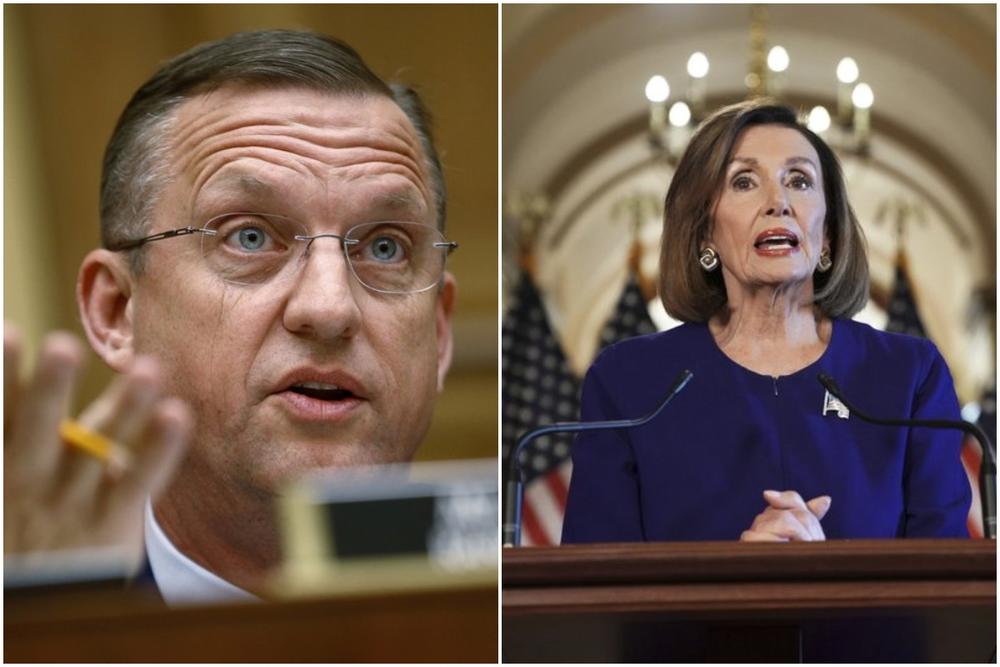Section Branding
Header Content
Doug Collins, Nancy Pelosi Spar Over Impeachment Rules
Primary Content
Rep. Doug Collins (R-Gainesville) is one of Georgia’s top Republicans in the House, and as such is leading the charge as one of President Donald Trump’s chief defenders during the ongoing impeachment inquiry on Capitol Hill.
Since House Speaker Nancy Pelosi’s announcement of a ‘formal impeachment inquiry’ Collins, the ranking member of the House Judiciary Committee, is challenging the legality of the inquiry saying she is abusing her power and withholding due process from the president.
Days after Pelosi and House Intelligence Committee Chairman Rep. Adam Schiff (D-Calif.) announced a formal inquiry, Collins filed an amicus brief in federal court arguing “the House has not authorized it to conduct a formal impeachment proceeding.”
House Democrat “investigations” further reveal “impeachment” as a sham. The House hasn’t authorized a formal impeachment inquiry, and it has no real claim to grand jury information.
The Speaker’s press conferences have no legal effect.
Why that matters: https://t.co/V1FmWJhukX— Rep. Doug Collins (@RepDougCollins) October 3, 2019
Collins said a vote must be held in the House of Representatives before the impeachment process can begin. In an interview on Fox News, he said Democratic leadership in the House is "running roughshod over the rules" when it comes to the process for impeachment inquiries.
Speaking exclusively to GPB News and Atlanta Journal-Constitution reporters in Atlanta, Pelosi retorted saying, “We are honoring the Constitution of the United States and it was only after we had a full viewing of the facts of what the president did that I called for an inquiry under the rules of the house.”
House Speaker Nancy Pelosi responding to President Trump’s demand for a full House vote formalizing the impeachment inquiry. pic.twitter.com/ZCTbBKp3wy— Robert Jimison (@RobertJimison) October 4, 2019
The pressure from Collins was coupled with reports that the White House Counsel’s office is preparing to send a letter to Pelosi objecting to the form of the impeachment investigation.
Pelosi maintained that she is not required to hold a vote.House Speaker Nancy Pelosi speaks about the House rules of impeachment.
“There’s nothing anywhere that says you have to vote on the floor. The rules say the committee makes a decision to proceed with an inquiry," Pelosi said. "And with all due respect for the president's astuteness in governmental affairs, I don't need his advice on how to run the House.”
Pelosi left the door open for the possibility of a vote in the future saying "we may decide to do it" but noted that it would not be a result from pressure from the president or Republican members of Congress.
RELATED: Nancy Pelosi On Democratic Strategy In Georgia Elections
“The inquiry is appropriate and so we're moving forward with it," she said. "I am not going to respond to any distractions that the Republicans may be throwing at them."
When Pelosi announced the House was beginning a formal inquiry, she did so without a vote, unlike the investigations into former Presidents Richard Nixon and Bill Clinton.
Trump said that he believes Democrats in the House have the votes to begin a formal impeachment inquiry, but since one was not held, White House lawyers are expected to direct officials not to cooperate with the probe because it was initiated without a House vote.
“Votes — not words or press conferences by Members, the Chairman, or the Speaker — are the mechanism through which Congress acts,” Collins said in his amicus filing. “A single House committee chairman, Members, or Speaker does not, and should not, wield the power to delegate the House’s impeachment authority without a full House vote.”
The pressure is also a political tactic to force the moderate contingency among Democratic members in the House who have not gone on record in support of impeachment. Some of whom – like 6th Congressional District Rep. Lucy McBath (D-Marietta) – were elected in districts that Trump won in 2016.
“They’re going to pay a tremendous price at the polls,” Trump said Friday.
In response, Pelosi said it is Republicans who are worried about having to go on record after learning about Trump’s politically motivated conversations with foreign leaders.
"You know who's most scared of having a vote on the floor: the Republicans,” she said. “We want to have a vote. No, our members are very comfortable with the vote. They're the ones who are going to have to answer for it.”
By not having a vote, Collins said Pelosi is not granting minority Republicans “due process” in the investigation. Right now, under normal House rules, Democratic members can convene hearings, call witnesses and issues subpoenas. Under the House rules during for a formal impeachment, Republicans, including Collins, would have gained those powers as well.

